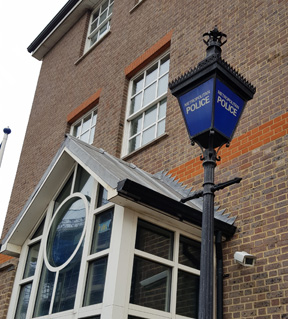HM Inspectorate of Constabulary found that more than 2,000 police warrant cards, issued to personnel who had since left the force, were unaccounted for by the Met Police (‘a significant operational security risk’). The force couldn’t say who it had allocated mobile phones and tablets (and as for the scale of the problem, some 45,000 SIM cards are in use in the Met). Some of its records about the receipt of gifts and hospitality were ‘in disarray’. These all indicate an organisation which is not taking the risks of corruption anywhere near seriously enough, the inspectors concluded.
This report arose from an independent panel into the unsolved murder of PI Daniel Morgan in 1987 in a south London pub car park, which in June 2021 found that the Metropolitan Police was ‘institutionally corrupt’. The inspectors stopped short of that, but the inspectors reported that they saw the ‘hallmarks of limited resources allocated to the maintenance of professional standards, professional incompetence, a lack of understanding of important concepts, poor management or genuine error, rather than dishonesty’.
A foreword by Matt Parr to the report said: “Inexcusably, 35 years after Daniel Morgan’s murder, the force had not taken adequate steps to correct all that went wrong during its investigations. Arrangements for the storage of property and exhibits were especially dire: hundreds of items (including cash, jewellery and drugs) could not be accounted for; firearms had not been correctly stored; and some property stores were overflowing and lacked adequate security (we even found that the security access code for one store had been inscribed on the outside of the door).”
Not all was ‘depressing’ as the foreword put it; the inspectors did find that het Met’s capability to investigate the most serious corruption allegations is ‘particularly impressive’. These investigations are thorough and apply the most up-to-date methods. Other forces regularly call on the Metropolitan Police’s expertise. The force’s confidential reporting line also works well. The force has even introduced a dedicated team to support ‘whistle-blowers’, something not seen in other police forces.
However the inspectors described record keeping as ‘woeful’; for example the inspectorate was ‘surprised to find that police officers and staff did not have to disclose their association with journalists or extremist groups’, despite national guidance to the contrary and ‘a history of scandals’. The inspectorate complains that its advice to the Met has gone largely unheeded from years before – ‘its inability to monitor its own IT systems; shortcomings in its vetting processes; its failure to adopt nationally approved counter-corruption recording methods; and its failure to form effective links with organisations that support vulnerable people’, who may fall prey to corrupt police.
On IT monitoring, as done by other forces – and something else that the inspectorate has flagged up before – that’s to spot signs of potential corruption, such as in high overtime and expense earnings; inappropriate usage of force-issue credit cards; and excessive use of force phones, including SMS messages. The Met’s new IT system is delayed; and when it comes in, it will provide the Met ‘with even less auditing capability than it has on its current systems’, the report says.
On vetting, the report points out it’s necessary because ‘risk of criminal infiltration into policing is very real’. A previous inspection in December 201 established that the Met had about 16,000 personnel (about 37 percent of its workforce) who had either never been vetted or whose vetting had expired. As of September 2021, its number of unvetted personnel stood at only 671; while the report gave credit for that, it added that the Met admits to many duplicate records, ‘which doesn’t inspire confidence in the accuracy and reliability of the process, inspectors said. They judged there’s tension ‘between HR objectives to meet recruitment targets and the FVU [vetting unit] objectives to admit only those with sufficiently high levels of integrity’.
As for info-security; use of encrypted apps, such as WhatsApp, on mobile phones, makes the monitoring of what officers and staff are sharing on their work phones ‘very difficult’, the report says; the Met routinely does not allow those apps on its mobiles. Many officers and staff told the inspectors however that they do not have a force-issue mobile, and instead use their private mobile phones, including encrypted apps, for operational purposes. While in some cases this may be being done with the best of intentions it is a risk to information security and data protection, the report says.
For the full report visit the HMIC website.
Comment
Deputy Commissioner Sir Steve House is due to be interim Commissioner when Cressida Dick leaves having resigned. He said that he accepted that there was a lot of work to do to rebuild trust, ‘to show that we are changing and learning’. He said: “I take counter corruption work very seriously. It is well resourced and we have been praised for our work in this area. This will continue.
“But prompted by the Police Inspectorate, we will look at the structures and processes to make sure they are as effective as possible
“I am professionally disappointed that some of the elements that support the service in countering corruption have not been working well enough. This is already being put right.
“There are some areas where our judgment is different from the Police Inspectorate.
“I have read the criticism regarding employing officers with convictions. Each and every case is considered extremely carefully. We believe, in the right circumstances, in giving people a second chance.”










